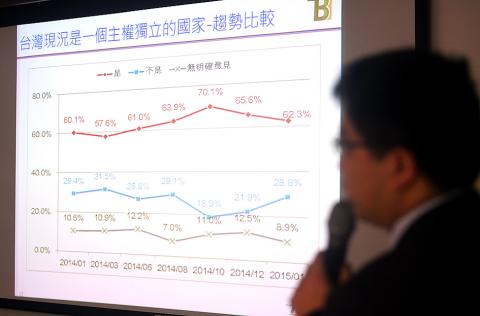A poll conducted by the Taiwan Braintrust shows that nearly 90 percent of the population would identify themselves as “Taiwanese” rather than “Chinese” if they were to choose between the two — and the percentage is even higher among those aged from 20 to 40.
With 1,079 valid samples from 20 cities and counties, the results show that if given the option of being “Taiwanese” or “Chinese,” 89.5 percent of respondents said they would identify themselves as Taiwanese, while just 6 percent said they consider themselves Chinese.
Notably, the percentage of people considering themselves Taiwanese rather than Chinese was larger for younger generations.

Photo: Liao Chen-huei, Taipei Times
Among those aged 70 or older, 76.2 percent said they consider themselves Taiwanese rather than Chinese, while 8.8 percent said they think of themselves as Chinese.
However, for people between 30 and 39 years of age, 93 percent identified themselves as Taiwanese, while 3.2 percent said they are Chinese, and for people from 20 to 29 years old, 92.5 percent identify themselves as Taiwanese, while just 2.4 percent said they are Chinese.
As for the nation’s future, 31.2 percent of respondents said they support independence for Taiwan, while 56.2 percent would prefer to maintain the “status quo” and 7.9 percent support unification with China.
However, when given “independence” and “unification” as the only options, 68.9 percent said they would support independence, while 17.1 percent would support unification with China.
Support for independence is also higher among younger generations, with 79.1 percent of people from 20 to 29 years of age supporting independence, while 12.7 percent support unification with China.
The poll also asked respondents about their impressions of domestic political parties and leaders.
Among the Democratic Progressive Party (DPP), the Chinese Nationalist Party (KMT), the Taiwan Solidarity Union and the People First Party, 33.9 percent of respondents said they prefer the DPP, while 20.5 percent said they support the KMT.
As for the parties’ leaders, 65 percent of respondents said they are satisfied with DPP Chairperson Tsai Ing-wen’s (蔡英文) performance, while 20.8 percent said they are not satisfied with her performance.
KMT Chairman and New Taipei City Mayor Eric Chu’s (朱立倫) support was a little behind, with 46.7 percent saying they are satisfied with his performance, while 27.1 percent are not.
At a press conference to release the results, former presidential adviser Koo Kwang-ming (辜寬敏) criticized Tsai, saying she is unable to solve most of the nation’s problems, including issues of cross-strait relations, while Tainan Mayor William Lai (賴清德) could work things out.
“Our objective is not to get someone elected president; we need a president who can lead Taiwan and solve all the problems,” he said.

Chinese spouse and influencer Guan Guan’s (關關) residency permit has been revoked for repeatedly posting pro-China videos that threaten national security, the National Immigration Agency confirmed today. Guan Guan has said many controversial statements in her videos posted to Douyin (抖音), including “the red flag will soon be painted all over Taiwan” and “Taiwan is an inseparable part of China,” and expressing hope for expedited reunification. The agency last year received multiple reports alleging that Guan Guan had advocated for armed reunification. After verifying the reports, the agency last month issued a notice requiring her to appear and explain her actions. Guan

GIVE AND TAKE: Blood demand continues to rise each year, while fewer young donors are available due to the nation’s falling birthrate, a doctor said Blood donors can redeem points earned from donations to obtain limited edition Formosan black bear travel mugs, the Kaohsiung Blood Center said yesterday, as it announced a goal of stocking 20,000 units of blood prior to the Lunar New Year. The last month of the lunar year is National Blood Donation Month, when local centers seek to stockpile blood for use during the Lunar New Year holiday. The blood demand in southern Taiwan — including Tainan and Kaohsiung, as well as Chiayi, Pingtung, Penghu and Taitung counties — is about 2,000 units per day, the center said. The donation campaign aims to boost

A preclearance service to facilitate entry for people traveling to select airports in Japan would be available from Thursday next week to Feb. 25 at Taiwan Taoyuan International Airport, Taoyuan International Airport Corp (TIAC) said on Tuesday. The service was first made available to Taiwanese travelers throughout the winter vacation of 2024 and during the Lunar New Year holiday. In addition to flights to the Japanese cities of Hakodate, Asahikawa, Akita, Sendai, Niigata, Okayama, Takamatsu, Kumamoto and Kagoshima, the service would be available to travelers to Kobe and Oita. The service can be accessed by passengers of 15 flight routes operated by

The Central Weather Administration (CWA) said a magnitude 4.9 earthquake that struck off the coast of eastern Taiwan yesterday was an independent event and part of a stress-adjustment process. The earthquake occurred at 4:47pm, with its epicenter at sea about 45.4km south of Yilan County Hall at a depth of 5.9km, the CWA said. The quake's intensity, which gauges the actual effects of a temblor, was highest in several townships in Yilan and neighboring Hualien County, where it measured 4 on Taiwan's seven-tier intensity scale, the CWA said. Lin Po-yu (林柏佑), a division chief at the CWA's Seismological Center, told a news conference